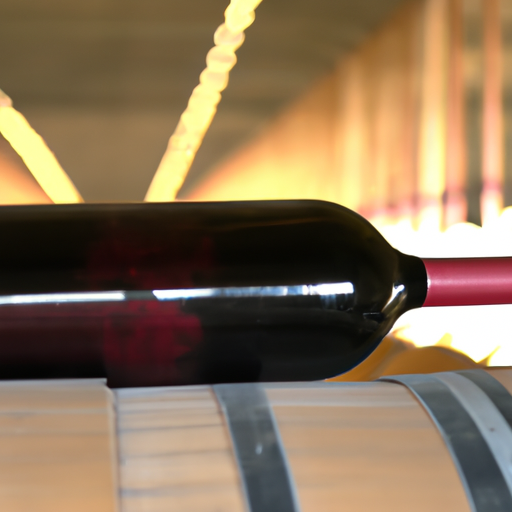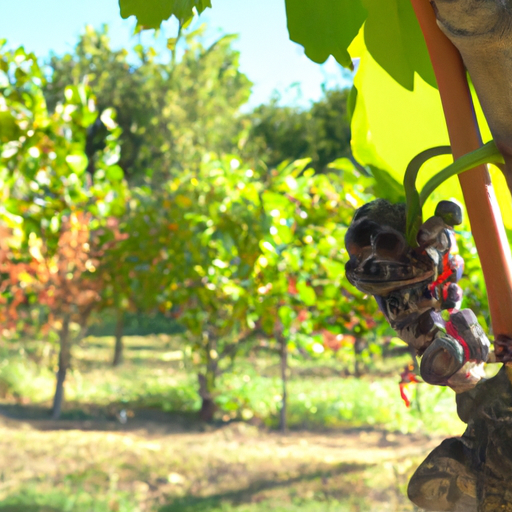
The Art of Biodynamic Winemaking: Unveiling Nicolas Joly’s Approach
Exploring the Essence of Wine: Insights from Nicolas Joly
The world of winemaking is a fascinating one, with countless techniques and approaches that have been developed over centuries. One such approach is biodynamic winemaking, a method that seeks to create a harmonious relationship between the vineyard and the surrounding ecosystem. At the forefront of this movement is Nicolas Joly, a renowned winemaker from the Loire Valley in France.
Nicolas Joly’s approach to winemaking is deeply rooted in the principles of biodynamics. Biodynamics is a holistic approach to agriculture that views the vineyard as a self-sustaining ecosystem. It takes into account the cycles of the moon and planets, as well as the influence of cosmic forces on the growth and development of the vines. By working in harmony with these natural rhythms, Joly believes that he can produce wines that truly reflect the terroir of his vineyards.
One of the key principles of biodynamic winemaking is the use of preparations made from natural materials. These preparations, which are applied to the soil and the vines, are designed to enhance the vitality and health of the vineyard. For example, Joly uses a preparation made from cow manure, which is buried in a cow horn and then buried in the ground for several months. This preparation is then diluted and sprayed onto the vines, providing them with essential nutrients and promoting healthy growth.
In addition to these preparations, Joly also employs a range of other techniques to promote biodiversity in his vineyards. He plants cover crops between the rows of vines, which helps to prevent erosion and provides a habitat for beneficial insects. He also encourages the growth of wildflowers and other native plants, which attract pollinators and help to maintain a balanced ecosystem.
Another important aspect of Joly’s approach to winemaking is the use of minimal intervention in the cellar. Unlike many winemakers who rely on additives and manipulations to achieve a desired flavor profile, Joly believes in allowing the wine to express itself naturally. He uses native yeasts for fermentation, avoids filtration and fining, and minimizes the use of sulfur dioxide, a common preservative in winemaking. This hands-off approach allows the wine to develop its own unique character and reflects the true essence of the grapes.
Joly’s commitment to biodynamic winemaking has not gone unnoticed. His wines have gained international acclaim for their purity, complexity, and sense of place. Critics and consumers alike have praised his ability to capture the essence of his vineyards in each bottle. Joly’s wines are a testament to the power of biodynamics and the potential for winemaking to be a truly sustainable and regenerative practice.
In conclusion, Nicolas Joly’s approach to winemaking is a testament to the power of biodynamics. By working in harmony with the natural rhythms of the vineyard, Joly is able to produce wines that truly reflect the terroir of his vineyards. His use of natural preparations, promotion of biodiversity, and minimal intervention in the cellar all contribute to the unique character and quality of his wines. As the world of winemaking continues to evolve, Joly’s approach serves as a reminder of the importance of sustainability and the potential for wine to be a true expression of time and place.
Understanding Terroir: Nicolas Joly’s Perspective on Wine’s Sense of Place

Exploring the Essence of Wine: Insights from Nicolas Joly
Understanding Terroir: Nicolas Joly’s Perspective on Wine’s Sense of Place
When it comes to wine, there is much more than meets the eye. Beyond the flavors and aromas, there is a deeper essence that connects the wine to its place of origin. This concept, known as terroir, is a fundamental aspect of winemaking that has been explored and celebrated by many experts in the field. One such expert is Nicolas Joly, a renowned French winemaker and biodynamic viticulturist.
For Joly, terroir is not just a buzzword or a marketing term. It is a philosophy that guides his entire approach to winemaking. He believes that the true essence of wine lies in its ability to express the unique characteristics of the land from which it comes. In his vineyards in the Loire Valley, Joly practices biodynamic farming, a holistic approach that takes into account the interconnectedness of the soil, plants, and the surrounding ecosystem.
According to Joly, terroir is not limited to the physical attributes of the land, such as soil composition and climate. It also encompasses the cultural and historical context of the region. He believes that the traditions and practices passed down through generations play a crucial role in shaping the character of the wine. By respecting and preserving these traditions, Joly aims to create wines that are not only delicious but also deeply rooted in their sense of place.
To achieve this, Joly employs a hands-off approach in the winemaking process. He believes that the role of the winemaker is not to manipulate the wine but rather to guide it on its journey from vine to bottle. This means minimal intervention in the cellar, allowing the wine to develop naturally and express its true character. Joly also emphasizes the importance of using native yeasts for fermentation, as they are believed to contribute to the unique flavors and aromas of the wine.
In addition to his biodynamic practices, Joly also pays close attention to the concept of biodiversity. He believes that a healthy vineyard ecosystem, with a diverse range of plants and animals, is essential for the expression of terroir. By encouraging biodiversity, Joly aims to create a balanced and harmonious environment that allows the vines to thrive and produce grapes of exceptional quality.
Joly’s approach to winemaking has garnered both praise and criticism. Some argue that his methods are too unconventional and that they may not always result in consistent wines. However, Joly sees this as a necessary trade-off for the sake of authenticity and expression of terroir. He believes that the true beauty of wine lies in its imperfections and that each bottle is a unique reflection of its time and place.
In conclusion, Nicolas Joly’s perspective on terroir offers valuable insights into the essence of wine. By embracing the interconnectedness of the land, culture, and history, Joly aims to create wines that are deeply rooted in their sense of place. Through his biodynamic practices and emphasis on biodiversity, he strives to express the true character of the vineyard and the region. While his methods may be unconventional, they are a testament to his commitment to authenticity and the pursuit of excellence in winemaking.
The Philosophy of Natural Wine: Exploring Nicolas Joly’s Sustainable Winemaking Practices
Exploring the Essence of Wine: Insights from Nicolas Joly
The world of wine is a vast and complex one, with countless varieties and styles to choose from. However, amidst this diversity, there is a growing movement towards natural winemaking practices. One of the pioneers of this movement is Nicolas Joly, a French winemaker who has dedicated his life to producing wines that are not only delicious but also sustainable.
Joly’s philosophy of winemaking is deeply rooted in the concept of terroir, which refers to the unique combination of soil, climate, and geography that gives each wine its distinctive character. According to Joly, the essence of wine lies in its ability to express the terroir from which it comes. This belief is at the core of his sustainable winemaking practices.
One of the key principles of Joly’s approach is biodynamics, a holistic farming method that treats the vineyard as a self-sustaining ecosystem. Unlike conventional farming, which relies heavily on chemical fertilizers and pesticides, biodynamics seeks to enhance the natural fertility of the soil and promote biodiversity. This is achieved through practices such as composting, cover cropping, and the use of herbal preparations to stimulate plant growth.
Another important aspect of Joly’s philosophy is the use of indigenous yeasts in the fermentation process. While many winemakers rely on commercial yeasts to control the fermentation and achieve consistent results, Joly believes that this approach stifles the true expression of the terroir. Instead, he allows the natural yeasts present on the grape skins to initiate fermentation, resulting in wines that are more complex and reflective of their origin.
In addition to these sustainable practices, Joly also emphasizes the importance of minimal intervention in the winemaking process. This means avoiding excessive filtration, fining, and other manipulations that can strip the wine of its natural flavors and aromas. By allowing the wine to develop at its own pace, Joly believes that he can capture the true essence of the grapes and create wines that are truly unique.
The results of Joly’s sustainable winemaking practices speak for themselves. His wines have gained international recognition for their exceptional quality and distinctiveness. They are often described as having a sense of place, with flavors and aromas that reflect the specific characteristics of the vineyard.
But Joly’s impact extends beyond his own vineyards. Through his writings and lectures, he has become a leading advocate for natural winemaking and a source of inspiration for winemakers around the world. His philosophy has sparked a renewed interest in sustainable practices and a greater appreciation for the diversity and complexity of wine.
In conclusion, Nicolas Joly’s sustainable winemaking practices offer valuable insights into the essence of wine. By embracing the concept of terroir and employing biodynamics, indigenous yeasts, and minimal intervention, Joly has created wines that are not only delicious but also reflective of their origin. His philosophy serves as a reminder that wine is more than just a beverage – it is a living expression of the land from which it comes.






